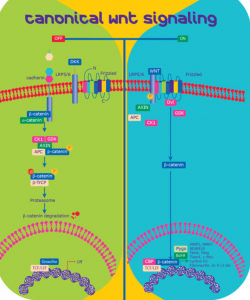Schizophrenia is easily one of the most recognizable psychiatric disorders. However, the disease is more complicated than people believe. First, there are two categories of symptoms: positive and negative symptoms. Positive symptoms are the more famous of the categories. These include symptoms like hallucinations and delusions. Negative symptoms include withdrawal and a sort of “flatness” or “coldness” in expressing emotion.
The exact pathology of schizophrenia is unknown, though there are several theories. Infections during pregnancy likely play a role, making schizophrenia a developmental brain disorder rather than a traditional psychiatric disorder. There is also some genetic factors, mainly involving extra or missing copies of various genes.
One possible mechanism for schizophrenia involves the Wnt pathway. Wnt is a signaling molecule that connects the LRP5/6 protein to the frizzled protein. This activates the disheveled or Dvl protein. Meanwhile, the protein beta catenin is normally bound up in a protein complex. When Dvl is activated, it frees beta catenin from this complex. Beta catenin can then enter the nucleus and bind to DNA. Here, it ensures that the transcription factors (factors that aid in the creation of RNA and eventually proteins) TCF/LEF bind to DNA and make proteins. All of this can be seen in the picture below. [1]

Schizophrenia involves an increase in dopamine. Dopamine binds to the D2 receptor, which in turn activates the enzyme Akt. This enzyme stops the inhibition of GSK3 beta, one of the proteins in the complex that holds beta catenin at bay. Since GSK3 is more active, beta catenin is less active, making it unable to reach the nucleus.
A lot of this information has been found without directly experimenting with schizophrenia. It is not really possible to give an animal schizophrenia. Most of this information comes from studying the exact effects that anti-psychotics have on the brain and studying animals that have a modified Wnt pathway.
Most people have likely heard of schizophrenia. It’s the disorder with the hallucinations right. But, few people have actually experienced it. Schizophrenia affects around 1 percent of the world population and about 1.2 percent of the United States population, that’s about 3.2 million people.[i] Since it’s not as common as general anxiety disorder or major depressive disorder, schizophrenia doesn’t get studied as much and there are fewer drugs on the market for it. Those that are on the market often have harsh side-effects. Today’s current antipsychotics are on the right tract in terms of targeting the Wnt pathway. Lithium also targets the Wnt pathway, but isn’t typically prescribed for schizophrenia, or even bipolar disorder. From this, it would seem that there’s a need for different drugs used to treat schizophrenia, but there’s a belief about the lack of demand. However, just because a disorder is rare doesn’t mean it isn’t worth studying. Three point two million people is still a lot of people and for many this disorder is very real.
In the conclusion of the An Emerging Role for Wnt and GSK3 Signaling Pathways in Schizophrenia, KK Singh discusses how schizophrenia is complicated and hard to replicate in the laboratory, especially in animal models. This phenomenon does give science some hope. We may not be able to give animals schizophrenia, but we can play around with this pathway to induce schizophrenia-like symptoms, allowing us to better study it. However, this should not deter us from studying it. If anything, it should challenge and inspire us.
[i] https://www.mentalhelp.net/schizophrenia/statistics/
[1] https://www.google.com/url?sa=i&source=images&cd=&ved=2ahUKEwiThNPtwI3lAhXSN30KHQ_FAo8QjRx6BAgBEAQ&url=%2Furl%3Fsa%3Di%26source%3Dimages%26cd%3D%26ved%3D2ahUKEwi8htnZwI3lAhV1FjQIHf0rB-8QjRx6BAgBEAQ%26url%3Dhttps%253A%252F%252Fwww.sigmaaldrich.com%252Ftechnical-documents%252Farticles%252Fbiology%252Fwnt-b-catenin.html%26psig%3DAOvVaw1G2G9ON-ZgHeVdlpZUp72-%26ust%3D1570653027209872&psig=AOvVaw1G2G9ON-ZgHeVdlpZUp72-&ust=1570653027209872